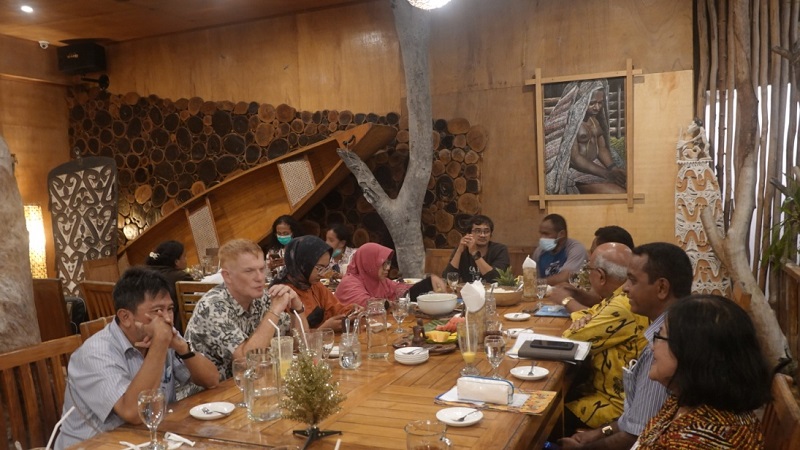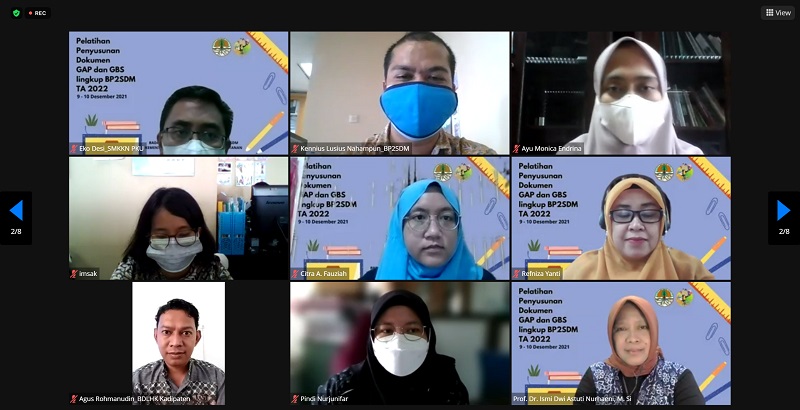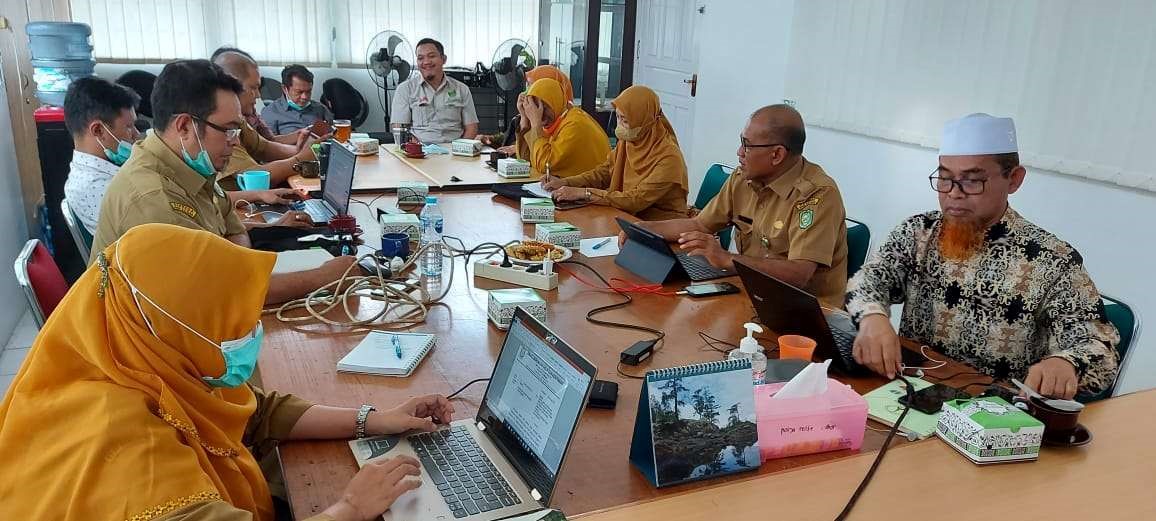FORCLIME
Forests and Climate Change ProgrammeTechnical Cooperation (TC Module)

Select your language

In 2021, FORCLIME supported the University of Ottow Geissler Papua (UOGP) in facilitating the Free, Prior Informed Consent (FPIC) process for the establishment of the Nyei Toro Educational Forest, as well as in identifying the need to establish a Center of Excellence for Geographic Information Systems (GIS) and mapping. This FORCLIME support will continue during 2022 in the form of various jointly implemented activities that were decided at a coordination meeting attended by FORCLIME and the UOGP on 9 December 2021 in Jayapura, Papua. The meeting was opened by Vice-Chancellor I of UOGP, George.M. Satya, M.Sc. Ph.D., and was also attended by the Director of Forestry and Water Resources Conservation of the Ministry of National Development Planning/Bappenas, Dr Nur Hygiawati Rahayu, ST, MSc, as well as representatives of the Planning Bureau of the Ministry of Environment and Forestry and representatives of the Center for Conservation and Natural Resources (BBKSDA) Papua.
Based on the discussion, several activities were decided upon for joint implementation during 2022, specifically an internship program for students of the UOGP Forestry Program, further development of the Nyei Toro Educational Forest and capacity building for Educational Forest managers, GIS training for lecturers and students in order to support the development of the Center of Excellence for GIS and mapping, and the establishment of a local committee of the International Forestry Students’ Association (IFSA).
During the meeting, Dr Nur Hygiawari Rahayu, ST, MSc, expressed her appreciation for the implemented FPIC process, stating, “The Nyei Toro Educational Forest is the first Educational Forest in Papua. Hopefully, in the future, this Educational Forest will become an example of sustainable forest management and protection, and will benefit local communities, both at the national and international levels.”
For more information, please contact:
Ruben Yogi, Junior Adviser for GIS and Forest Mapping
Theodora Florida Resubun, Adviser for Sustainable Forest Management and Coordinator for Papua Province
Mohammad Sidiq, Strategic Area Manager for Sustainable Forest Management and Coordinator for Papua and West Papua Provinces

Gender mainstreaming (PUG) in relation to development begins with the planning and budgeting process. Planning and budgeting documents with a clear gender perspective should be able to accommodate equality between men and women in terms of access, benefits and participation in decision-making in order to benefit development outcomes. Two of the gender analysis tools available in the planning and budgeting process are the Gender Analysis Pathway (GAP) and the Gender Budget Statement (GBS).
The PUG Sub-Working Group (WG) of the Human Resources Extension and Development Agency (BP2SDM) at the Ministry of Environment and Forestry (MoEF) is continuing to support the implementation of PUG at the policy, program and activity levels by encouraging all policy documents to incorporate a gender perspective. To this end, FORCLIME has offered its support for the PUG Sub-WG in BP2SDM as regards the implementation of training sessions on the development of GAP and GBS for BP2SDM activities and programs during 2022.
An online training session which dealt with these issues was held from Thursday 9 – Friday 10 December 2021 and was attended by 77 participants from the BP2SDM working unit and Balai Taman Nasional Wasur. The training opened with a number of remarks from Drs Ade Palguna, Secretary of BP2SDM, who expressed his expectation that PUG activities would continue to be developed and that champions would be created through the PUG training of trainers. A speech was also given by Dr Ir. Apik Karyana, M.Sc. the Head of the Planning Bureau for MoEF, who outlined the importance of translating the PUG concept into concrete activities.
The training was facilitated by Prof Dr Ismi Dwi Astuti Nurhaeni, M.Si from the Faculty of Social and Political Sciences at Sebelas Maret University. During the first day, the materials incorporated into the training sessions included gender responsive budgeting planning theory, an introduction to GAP, an introduction to GBS and the filling out of a GAP sheet. During the second day, training focused on the practice of reviewing GAP through the preparation of a BP2SDM working unit. Drafts of the GAP from Badan Diklat LHK Pematangsiantar and SMK Kehutanan Negeri Samarinda were chosen as examples to review. Through this approach, participants were able to actively discuss and exchange tips relating to the preparation of GAP in ways that precisely addressed gender-related issues.
‘In the future, BP2SDM needs to have complete data on the target participants of our activities, so that a baseline and targets for gender-responsive development can be clearly measured,’ explained Agus Setyawan, a representative from the BP2SDM Secretariat.
As a follow-up, training related to GBS is scheduled for 2022 and will commence with a review of GAP by all working units.
For more information, please contact:
Edy Marbyanto, Strategic Area Manager for Human Capacity Development
Nurdita Rahmadani, Junior Advisor for Monitoring, Evaluation and Reporting

In order to evaluate the 2021 work plan, the West Kalimantan REDD+ Working Group, in conjunction with FORCLIME, held a recent consolidation meeting that was attended by the Environment and Forestry Service of West Kalimantan Province, Tanjungpura University and development partners in West Kalimantan. The meeting was held on 10 December 2021 at the Secretariat of the West Kalimantan REDD+ Working Group and aimed to evaluate the achievements of the REDD+ Working Group targets for 2021.
The meeting was opened by Mr. Ir. Adiyani, MH, Head of the Environment and Forestry Service of West Kalimantan. Mr. Adiyani addressed the strategic role of the REDD+ Working Group in relation to emissions reduction at the provincial level, the plan to adjust the institution of the REDD+ Working Group in accordance with climate-change issues at the global and national levels, changes to institutional nomenclature within the West Kalimantan Provincial Government and plans to involve a wider selection of stakeholders at the provincial level.
Furthermore, Prof. Dr. Gusti Hardiansyah as Chair of the REDD+ Working Group, delivered an update on climate change that addressed issues at the global and national levels, specifically as regards the 2021 Conference of the Parties (COP26), the emissions reduction targets that the REDD+ Working Group needs to anticipate and the importance of strengthening data and information, particularly in relation to measurement and monitoring activities.
This update was then followed by a discussion that was held by the meeting participants and that tackled an evaluation of the activities of the REDD+ Working Group during the 2021 period, which included:
• Working Group performance until quartal 3, 2021.
• Changes in the nomenclature of government institutions at the provincial level.
• The urgency of involving other parties in the Working Group.
• Finalization of the West Kalimantan Measurement, Reporting and Verification (MRV) website.
• Progress in the development of climate finance proposals relating to West Kalimantan's REDD+ activities, including the Green Climate Fund.
• Challenges and obstacles relating to the implementation of various activities.
As a follow-up, the REDD+ Working Group will revise various regulations that address the REDD+ Working Group as an institution, integrate the West Kalimantan MRV website into the national MRV website and also harmonize the plans and programs of the stakeholders that are aimed towards achieving emissions reduction targets at the provincial level.
For more information, please contact:
Yenny, S.Hut, MT, Environment and Forestry Service of West Kalimantan Province, Member of the West Kalimantan REDD+ Working Group
Jumtani, Advisor for Sustainable Forest Management and GCF Focal Point
Wandojo Siswanto, Strategic Area Manager for Forest Policy and Climate Change


